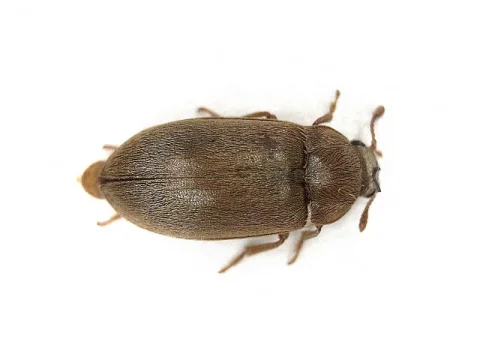Raspberry beetle on raspberry plants.
Control of the Raspberry Beetle to protect your raspberry plants.
The raspberry beetle (Byturus tormentosus) can be a serious pest of cane fruit such as raspberries, blackberries and loganberries. Damage is caused by the adults feeding on the leaves and flowers as well as larvae feeding on the fruit.
Fortunately, they can be controlled without pesticides and we now supply Raspberry Beetle Traps in our range. If you do intend to use an insecticide, the traps can also be used as a way of detecting the best time to spray.



This pest damages both wild and cultivated raspberries and blackberries.
Our natural trap allows you to detect signs of the beetle, then catch without pesticides once they emerge in the spring. The attractant lure is irresistible to the beetles, trapping them and removing the danger to your plants.
The trap is best used as beetles emerge before the first flowers appear between April-June. For later flowering berries, a second lure can be used. Each lure will last for 6 weeks.
Trap found here: Raspberry Beetle Trap
Refills found here: Raspberry Beetle Trap Replacement Lure
If you need any more information or advice don't hesitate to get in contact with us. We're always happy to help. - Contact Us (mosskillers.co.uk).
Related Articles
How can I protect raspberry plants from pests such as beetles?
Raspberry plants can be seriously affected by the raspberry beetle (Byturus tormentosus). Adults feed on leaves and flowers and the larvae feed and damage fruit. The raspberry beetle is attracted to plants by sight and smell and so a trap is designed ...Can I spray Baticlean CR and other products near plants?
When applying Baticlean CR, to ensure an even coverage it is always best to use a sprayer. When using a sprayer, to protect plants from any spray drift, it is best to hold a piece of cardboard over your plants or invest in a spray hood which will ...Do you sell replacement lures for pest control traps?
The enjoyment of our home and garden can often be spoiled by troublesome pests. Our solutions for pest control are sturdy, reusable and free of dangerous chemicals. If you purchase one of our pest control solutions we can supply you replacement ...How soon after applying glyphosate weedkiller can I seed new grass or add new plants?
Glyphosate does not move once applied, so generally, it doesn't affect untreated plants, such as nearby flowers. In soil, glyphosate usually breaks down within a few days so it becomes unavailable to plants that are planted later on. We recommend to ...What are Nematodes? Why are they so beneficial?
What are Nematodes? And why are they the best option for your garden? Nematodes, also known as roundworms, are a diverse group of organisms that live in a wide range of environments, from deep ocean trenches to lush garden soils. The vast majority of ...